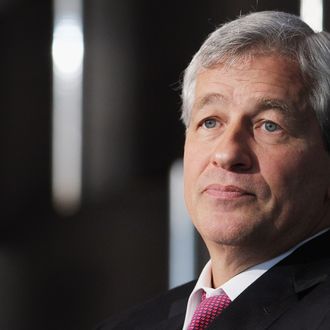
Today is Jamie Dimon’s big day in front of the Senate banking committee, where the JPMorgan CEO is scheduled to testify about the London Whale fiasco and what, exactly, turned a “tempest in a teapot” into a $2 billion-plus loss.
Dimon’s prepared testimony is out — it includes no new revelations about the Whale’s trades or the risk controls in the bank’s chief investment office, though it does have a quote calling the $2 billion loss an “isolated event,” which will be fun to have played back to him on Meet the Press if another trade goes wrong in the future.
Although we’d like to believe that the committee’s members will have a thorough enough understanding of the capital markets and the pertinent regulatory issues to ask questions like “Did JPMorgan’s risk managers discuss taking a $2–4 billion reserve against the CIO positions more than two years ago out of fear that the OTC contracts weren’t liquid enough?”, we’re settling in for a morning of mildly incoherent grandstanding.
Andrew Ross Sorkin wrote a list of suggested questions for Dimon, as did Occupy the SEC. Both are worth reading.
But as of today, the questions we’d most like to see answered have less to do with how Dimon allowed one of his traders to build up a huge, illiquid position under a faulty risk model, and more to do with how he lost his pedestal at JPMorgan.
Both Bloomberg and the Journal came out this week with deep dives into JPMorgan’s chief investment office, the division that housed the Whale. The Journal paints a picture of a CIO with a generally carefree attitude toward risk, which it claims Dimon failed to oversee properly, while Bloomberg looks at how Dimon dealt with — or shrugged off — specific warning signs from his deputies that the London trading desk’s risk profile had grown substantially.
Neither report is good for Dimon ahead of his congressional grilling, but Bloomberg’s take is more personally damning. While the Journal’s explanation would give ammunition to critics of big banks who say they’re “too big to manage,” it hardly makes Dimon look willfully negligent. Bloomberg’s story, on the other hand, is a cleats-up attack on Dimon.
What’s most amazing is that the attack, like a phone call in a horror movie, seems to be coming from inside the building:
The question of CIO oversight arose in the months after the crisis, when top JPMorgan executives heard what Macris and his fellow traders in the London office were doing and raised concerns to Dimon that the unit’s risk management was inadequate, according to the two executives familiar with the conversations.
William Winters and Steven Black, co-heads of JPMorgan’s investment bank at the time, were among those who sought more information about the CIO’s changing risk profile, according to people who participated in or witnessed the conversations.
James “Jes” Staley, 55, who ran asset management at the time and now heads the investment bank, and John Hogan, then the investment bank’s chief risk officer, also questioned why risk controls inside the CIO weren’t as extensive or robust as in other departments.
Even if Winters, Black, Staley, or Hogan weren’t the anonymous sources for this tidbit, the fact that it’s out there means that someone who worked very closely with Dimon several years ago is now trying to make him look bad. (For what it’s worth, a JPMorgan spokeswoman called the Bloomberg version of these conversations “absurd.”)
Dimon used to have a halo on Wall Street, and at JPMorgan more specifically. Now, it seems like even his close associates are selling him down the river. Sadly, that kind of question — of why a once-beloved CEO would suddenly find himself under siege from within his ranks — is probably outside the purview of today’s testimony.





























